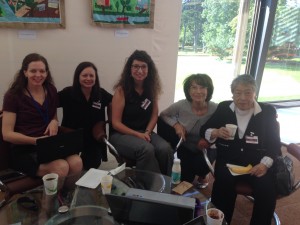Geneva, Switzerland (15 July 2014) — WEDO’s Eleanor Blomstrom traveled to Geneva for the First PrepCom of the Third World Conference on Disaster Risk Reduction as Organizing Partner for the Women’s Major Group (WMG) in that process.
Alongside a small team of dedicated women, and with support from others following online, the members of the WMG delivered strong statements on the importance of women’s leadership and participation in all stages of disaster risk planning and management, which were illustrated by recent experiences.
Ms. Akiko Domoto of the Japanese Women’s Network for Disaster Risk Reduction delivered an intervention (written, delivered) on behalf of the Women’s Major Group on Tuesday, July 15, making 5 clear points about HFA2:
1. It is essential that women are involved as leaders in decision-making, budgeting, and planning processes about disaster risk reduction at all levels;
2. The Framework must link to the larger Sustainable Development agenda and aim to transform structure, institutions and societies;
3. Strategies and actions for DRR must recognize the resilience and strength of women and girls, and support them as key actors in all phases of disaster risk reduction to ensure that their skills, knowledge, and capacities contribute to DRR, including through integration of women’s organizations and associations into the formal risk management structure;
4. Targets and indicators for monitoring and accountability must address socioeconomic and diverse dimensions of risk – with national governments collecting and reporting on sex-, gender- and age-disaggregated data throughout the disaster risk cycle; and
5. The review process for implementation of the post-2015 HFA2 must be undertaken with concerted effort by all stakeholders, including women, youth, indigenous peoples, and marginalized communities’ effective participation in all aspects.
WEDO’s Eleanor Blomstrom, WEL’s Grace Mbugua and Cheryl Anderson of the University of Hawaii also delivered interventions at the conference during the Chair’s Dialogues through statements (Dialogue #1 and Dialogue #2).
The WMG team met with various Member States to share recommendations and provide technical support, as well as build relationships and ensure continued input from the WMG during the informal phase of consultations before PrepCom2. It will be crucial to take advantage of the time available in preparation toward PrepCom2 to widen and diversity the active WMG membership, so that the WMG will be larger and even more effective in its advocacy and technical support to Member States as the process moves toward the World Conference in March 2015.
Outcomes
Two reports are expected from the first PrepCom. The first is the draft report capturing the major decisions of the meeting and adopted on site before closing on the 15th. The second is a pre-zero draft that will be the basis for informal consultations throughout September and October, which will then be updated to a Zero Draft in advance of the second PrepCom on 17-18 November in Geneva.



